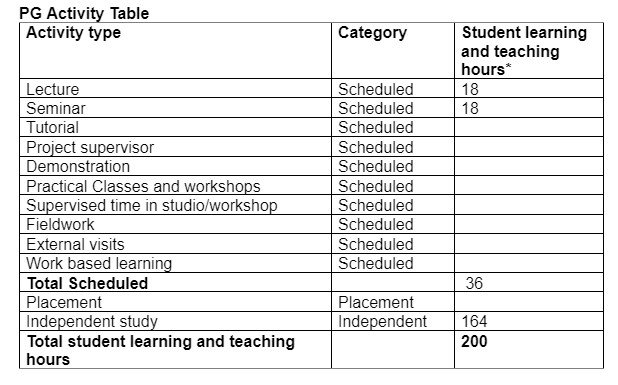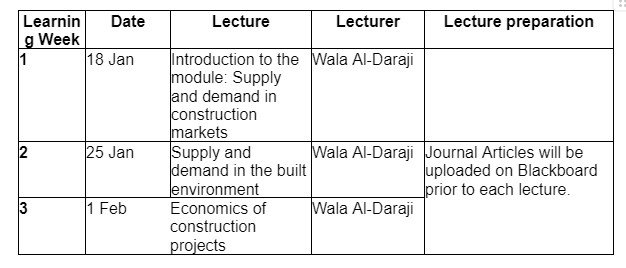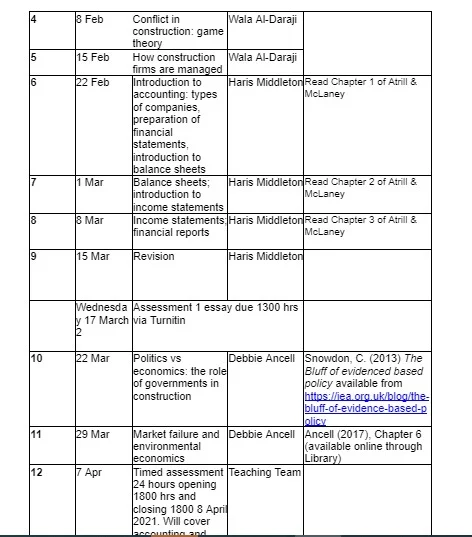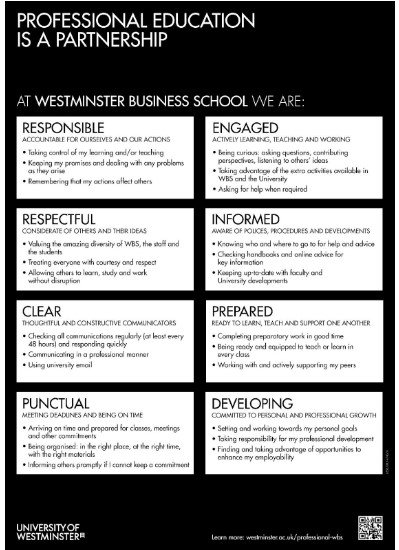Finance and Economics of the Construction Industry
MODULE TEACHING TEAM CONTACT DETAILS

DATES FOR YOUR DIARY
Key assignment submission and feedback return dates


The dates for the return of marks and/or feedback are determined by the University’s stated marking periods as given in the academic regulations. The Core Texts for this module are:
ACCOUNTING
Atrill, P. and E McLaney (2019) Accounting and Finance for Non- Specialists, Financial Times Prentice Hall.CONSTRUCTION ECONOMICS:
 1. Ancell, D. (2017) Clipped wings: corporate social and environmental responsibility in the airline industry, London and New York, Routledge
2 Gruneberg S and Francis N, (2018) The economics of construction, 1st edition, Agenda Publishing, ISBN 9781788210157
Gruneberg, S. and Ive, G. (2000) The economics of the modern construction firm, Basingstoke, Macmillan Press Ltd
Gruneberg, S. (1997) Construction Economics: an introduction, Basingstoke, MacMillan Press Ltd
5Myers, D. (2013) Construction economics – a new approach, London and New York, Routledge
Snowdon, C. (2013) The bluff of “evidence-based policy” available from https://iea.org.uk/blog/the-bluff-of-evidence-based-policy accessed 20 August 2020 (review of Whyte, 2013)
Whyte, J. (2013) Quack policy: abusing science in the cause of paternalism available from https://iea.org.uk/publications/research/quack-policy-%E2%80%93-abusing-science-in-the-cause-of-paternalism accessed 20 August 2020
1. Ancell, D. (2017) Clipped wings: corporate social and environmental responsibility in the airline industry, London and New York, Routledge
2 Gruneberg S and Francis N, (2018) The economics of construction, 1st edition, Agenda Publishing, ISBN 9781788210157
Gruneberg, S. and Ive, G. (2000) The economics of the modern construction firm, Basingstoke, Macmillan Press Ltd
Gruneberg, S. (1997) Construction Economics: an introduction, Basingstoke, MacMillan Press Ltd
5Myers, D. (2013) Construction economics – a new approach, London and New York, Routledge
Snowdon, C. (2013) The bluff of “evidence-based policy” available from https://iea.org.uk/blog/the-bluff-of-evidence-based-policy accessed 20 August 2020 (review of Whyte, 2013)
Whyte, J. (2013) Quack policy: abusing science in the cause of paternalism available from https://iea.org.uk/publications/research/quack-policy-%E2%80%93-abusing-science-in-the-cause-of-paternalism accessed 20 August 2020
Other readings will be added as required.
Take a deeper dive into Relationship Between Power And Knowledge with our additional resources.
Contents
- Introduction and welcome to the module
- Module aims, learning outcomes and indicative content
- Assessment
- Feedback arrangements
- Using your study time effectively
- Reading and key learning resources
- Module calendar
- WBS Professional Principles
- Please note that this module handbook serves as guidance for students taking this module.
- Some minor changes related to literature and video sources, seminar activities etc. may change during the course of the module and will be communicated by the module leader
- Key information such as the module learning outcomes, the methods of assessment and assessment deadlines will not change.
Ensure that you check the module Blackboard site and your University email regularly for announcements and updates.
INTRODUCTION AND WELCOME TO THE MODULE
The module introduces the structure of the industry, how relationships within it function, how it relates to the economic position of the State and provides the necessary analytical tools for evaluation of the firm within the industry, and the industry in the nation State.
Employability Link to the Module

Careers and Employability Service:
- https://www.westminster.ac.uk/current-students/support-and-services/careers-and-employability-service
Westminster Employability Award:
- https://www.westminster.ac.uk/current-students/employability-and-career-development/improving-your-employability/westminster-employability-award https://www.youtube.com/watch?time_continue=189&v=eaErNpoL7-I
Volunteering Opportunities:
- volunteering@westminster.ac.uk | 020 3506 6112 https://westminster.ac.uk/volunteering
Careers advice:
CV and interview preparation appointments are available from the CES (Career and Employability Service) westminster.ac.uk/careers Engage Login: https://engage.westminster.ac.uk/ Mentoring: Zurria Qureshi: z.qureshi3@westminster.ac.uk
MODULE AIMS, LEARNING OUTCOMES AND INDICATIVE CONTENT
Module aims:
To ensure that the student understands the scope of the business environment in which construction firms are competing. 2. To provide the economic and financial tools which are needed for successful analysis of the commercial environment.
Learning outcomes (LO)
On successful completion of the module the learner, operating autonomously and creatively, should be able to:
LO1: calculate P&L performance ratios and Balance sheet liquidity ratios to determine the overall performance of the company and make comparison with industry sector competitors.
LO2: undertake a cost analysis of companies in the construction sector to understand the structure of those companies and see how their supply chains have developed.
LO3: evaluate preferred investment options dependent on their cash flows and attitude to risk.
LO4 : analyse the impact of government economic policies on the construction industry
LO5: utilise supply and demand concepts to understand firm’s behaviour within the construction industry.
LO6: model conflict in the industry supply chains using game theory and establish optimum outcomes to conflict.
LO7: determine the most effective modes of co-operation between firms in large construction projects.
Indicative Syllabus Content
- Analysis of the construction industry
- Construction markets
- The operation of construction firms
- Land markets and construction
- Construction and the economy
- Quantitative technique
ASSESSMENT
The University has arrangements for marking, internal moderation and external scrutiny. Further information can be found in Section 12 of the Handbook of Academic Regulations, westminster.ac.uk/study/current-students/resources/academic-regulations .
Assessment 1:
- Module assignment. This is worth 50% of the module mark. This is an individual written report of a maximum of 2000 words. The topic is:
- The construction supply chain’ latest disruption has been due to coronavirus. However, the industry has been disrupted by other means in the past decade.
- Critically assess this statement in terms of supply and demand IN THE DECADE BEFORE CORONOVIRUS for four materials/services in the supply chain (i.e. approx. 500 words/item) in the country in which you are RESIDENT for this module .. Support your view with evidence from academic journals and supplementary sources. The coursework must be submitted electronically via Blackboard.
- If, in the view of the module leader, the written report is not representative of the student, the student may be invited to a “viva” (Oral presentation).
Assessment 2:
A timed assessment for 24 hours duration in week 12. This is worth 50% of the module mark and will comprise two sections with questions from the syllabus. The pass mark for the module is 50%. To pass overall, the overall total calculated from adding weighted marks in each assessment component must be 50% (If your mark for the module is between 0 –> 50% you will be required to complete one or more referral assessments and your mark for these will be capped at 50%). In addition to the detail given below, further information may be posted onto the
Anonymous marking
Do NOT include your name or student number within the coursework file name or anywhere within your submissions.
Eligibility of students for an ‘alternative assessment’
There are no alternative assignments
Assessment 1 criteria

Assessment General Threshold Criteria
Generic grade descriptors at level 7
80-100 An outstanding piece of work: All assessment criteria have been met at an exceptionally high standard.
Displays exceptional initiative, creativity, sophistication and originality • Provides insightful analysis • Demonstrates originality and rigour of argument • Shows independent synthesis of ideas and understanding • Demonstrates reflexivity and critical analysis to generate transformative solutions/responses • Demonstrates substantial independent research • Communicates complexity clearly and succinctly with excellent standard of presentatio
70-79 An excellent piece of work: All assessment criteria have been met at a high standard
• Demonstrates sophisticated understanding across the field of study and related areas • Draws on a range of techniques and information sources for independent analysis • Demonstrates creativity and flair in task/enquiry • Provides robust and insightful argument • Provides a high quality critical and reflexive analysis • Demonstrates substantial independent research • Communicates ideas clearly and succinctly with good standard of presentation 60-69 A good piece of work: All assessment criteria have been met at a good standard • Demonstrates breadth and/or depth of understanding across the field of study and related areas • Synthesises knowledge to address task/enquiry • Presents argument cogently and clearly • Demonstrates extensive research and critical use of resources • Communicates ideas clearly with a good standard of presentation
50-59 A sound piece of work: All assessment criteria have clearly been met.
Demonstrates understanding of appropriate range of concepts and theoretical approaches • Provides an argument to frame response to enquiry/task • Uses a range of relevant sources provided to undertake research • Undertakes meaningful analysis/reflection in relation to the enquiry/task • Communicates ideas using an appropriate format with few weaknesses in presentation
• Provides clear limitations in the range of concepts/principles explored • Demonstrates lack of clarity and depth of understanding in relation to the task/enquiry • Uses a narrow range of sources to support task/enquiry • Provides limited analysis/reflection • Communication is unclear with significant weaknesses in presentation
0-39 FAIL: A poor piece of work: Most of the relevant assessment criteria area not been met.
• Demonstrates poor understanding of key concepts and principles • Shows significant weaknesses and omissions in completing the task • Omits analysis/reflection • Uses inadequate information sources • Communication is unclear with significant weaknesses in presentation
Referencing requirements for assignments
Statements, assertions and ideas made in coursework should be supported by citing relevant sources. Sources cited in the text should be listed at the end of the assignment in a reference list. Any material that you read but do not cite in the report should go into a separate bibliography. Unless explicitly stated otherwise by the module teaching team, all referencing should be in Westminster Harvard format. If you are not sure about this, the library provides guidance (available via the library website pages).
Difficulties in submitting assignments on time
If you have difficulties for reasons beyond your control (e.g. serious illness, family problems etc.) that prevent you from submitting the assignment, make sure you apply to the Mitigating Circumstances board with evidence to support your claim as soon as possible. The WBS Registry or your personal tutor can advise on this.
Submitting your coursework - checks
Unless indicated otherwise, coursework is submitted via Blackboard. On the Blackboard home page for the module you will find a button on the menu called ‘Submit Coursework’. Clicking this will take you to the submission link. At busy times the coursework submission process may run slowly. To ensure that your submission is not recorded as a late submission, avoid submitting very close to the deadline.
To submit your assignment
Log on to Blackboard at https://learning.westminster.ac.uk; Go to the Blackboard site for this module; Click on the ‘Submit Coursework’ link in the navigation menu on the left-hand side Click on the link for the assignment; Follow the instructions.REMEMBER
It is a requirement that you submit your work in this way. All coursework must be submitted by 13:00 (UK Time on the due date). If you submit your coursework late but within 24 hours or one ‘working’ day of the specified deadline, 10% of the overall marks available for that assessment will be deducted as a penalty for late submission, except for work which is marked in the range 50-55%, in which case the mark will be capped at the pass mark (50%). If you submit your coursework more than 24 hours or more than one ‘working’ day after the specified deadline you will be given a mark of zero for the work in question. The University’s mitigating circumstances procedures relating to the non-submission or late submission of coursework apply to all coursework. If you are unclear about this, speak to your class leader or module leader.
FEEDBACK ARRANGEMENTS
Feedback for the coursework, submitted via Turnitin will be made available on the scripts on Turnitin in accordance with the deadlines shown on page 2 of this handbook. Feedback on the ICT will be given as a general cohort feedback, circulated by email.

USING YOUR STUDY TIME EFFECTIVELY
You have primary responsibility for your own learning. You will have a schedule of formal study where you will be working with academic staff and this is outlined later in this handbook. Alongside your scheduled studies, your private or ‘independent’ study is very important. This is the time that you spend learning without direct supervision from, or contact with, a member of teaching staff and this makes up a large part of your studies. It is likely to include background reading, preparation for seminars or tutorials, follow-up work, wider practice, the completion of assignments, revision and so on. Some independent study may be structured for you as a key part of your learning, but it also is the additional study you choose to undertake to further improve your learning.
To summarise, in general your study activity will break down into
- Scheduled contact/activity time (such as lectures, classes, tutorials, workshops, supervisions and other directed activities)
- Structured independent study (such as reading and preparing for scheduled learning activity)
- Module and course-based wider study (such as reading the business media, employability activities, personal tutoring activity )
- Assessment (working on coursework and/or preparing for and taking tests/exams
You should be putting in 10 hours of study time for every credit so you should plan to commit more hours than the class time in this module in order to gain the most of your studies.
PG Activity Table

These hours are indicative only and may be subject to change. They also indicate what would be typical. Your particular study needs may vary
If you are unclear on any aspect of making the best use of your study time on this module, speak to your class leader or the module leader.
Academic integrity
What you submit for assessment must be your own current work. It will automatically be scanned through a text matching system to check for possible plagiarism.
Do not reuse material from other assessments that you may have completed on other modules. Collusion with other students (except when working in groups), recycling previous assignments (unless this is explicitly allowed by the module leader) and/or plagiarism (copying) of other sources all are offences and are dealt with accordingly. If you are not sure about this, then speak to your class leader.
University of Westminster Quality and Standards statement
Plagiarism is a particular form of cheating. Plagiarism must be avoided at all costs and students who break the rules, however innocently, will be penalised. It is your responsibility to ensure that you understand correct referencing practices. As a University level student, you are expected to use appropriate references and keep carefully detailed notes of all your sources of material, including any material downloaded from the www.
Plagiarism is defined as submission for assessment of material (written, visual or oral) originally produced by another person or persons, without acknowledgement, in such a way that the work could be assumed to be your own. Plagiarism may involve the unattributed use of another person’s work, ideas, opinions, theory, facts, statistics, graphs, models, paintings, performance, computer code, drawings, quotations of another person’s actual spoken or written words, or paraphrases of another person’s spoken or written words.
Plagiarism covers both direct copying and copying or paraphrasing with only minor adjustments:
a direct quotation from a text must be indicated by the use of quotation marks (or an indented paragraph in italics for a substantive section) and the source of the quote (title, author, page number and date of publication) provided; a paraphrased summary must be indicated by attribution of the author, date and source of the material including page numbers for the section(s) which have been summarised
6. READING AND KEY LEARNING RESOURCES
ACCOUNTING:
Atrill, P. and E McLaney (2019) Accounting and Finance for Non- Specialists, Financial Times Prentice Hall.
Further reading
Alexander D. and C Nobes Financial Accounting (2020), Pearson 7th Edition Atrill, P. and E. McLaney (2019) Accounting and Finance: an introduction, Financial Times Press
Dyson, J. R., Franklin, E. (2020) Accounting for Non- Accounting Students, Pearson Education
Perks, R and D Leiwy (2013) Accounting Understanding and Practice, McGraw Hill
Websites
CONSTRUCTION ECONOMICS:
- Economics dictionary: any will be satisfactory – essential for key words
- Ancell, D. (2017) Corporate social and environmental responsibility in the airline industry, London and New York, Routledge
- Gruneberg S and Francis N, (2018) The economics of construction, 1st edition, Agenda Publishing
- Gruneberg, S. and Ive, G. (2000) The economics of the modern construction firm, Basingstoke, MacMillan Press Ltd
- Gruneberg, S. (1997) Construction Economics: an introduction, Basingstoke, MacMillan Press Ltd
- Lilley, P .(2016) Climate Change Act available from https://www.thegwpf.org/content/uploads/2016/12/CCACost-Dec16.pdf accessed 27 July 2020 (critique of the CCA – worth reading)
- Myers D. (2013) Construction Economics – a new approach, Routledge (insufficiently sceptical about environmental issues; many misunderstandings opinions) e.g. acid rain, ozone layer etc. not matched by science
- Snowdon, C. (2013) The bluff of “evidence-based policy” available from https://iea.org.uk/blog/the-bluff-of-evidence-based-policy
- accessed 20 August 2020 (review of Whyte, 2013)
- Whyte, J. (2013) Quack policy: abusing science in the cause of paternalism available from https://iea.org.uk/publications/research/quack-policy-%E2%80%93-abusing-science-in-the-cause-of-paternalism accessed 20 August 2020
Further reading
Ruddock, L., ed., (2009) Economics for the Modern Built Environment, Abingdon, Taylor and Francis
Periodicals and academic journals for construction
- International Journal of Project Management
- Construction Management and Economics
- Journal of Financial Management of Property and Construction
- Engineering, Construction and Architectural Management
- Building Research and Information
Web references
Office for National Statistics, for Construction Statistics Annual https://www.ons.gov.uk/businessindustryandtrade/constructionindustry/datasets/constructionstatisticsannualtables For labour statistics: https://www.dwp.gov.uk/docs/nomis.pdf
Other economics sources
- CityAM www.cityam.com Office of National Statistics (UK) www.statistics.gov.uk Bank of England: www.bankofengland.co.uk European Central Bank www.ecb.int The Financial Times www.ft.com International Monetary Fund
MODULE CALENDAR


Additional preparation materials may be posted on Blackboard. To benefit fully from your face-to-face taught sessions, these should be accessed and completed beforehand. Any changes to the schedule will be announced on Blackboard.
Continue your journey with our comprehensive guide to Field Powers on Isotropic Conductors.
Lecture capture
We support our students by providing complementary recordings* to support education and learning. Where possible we aim to offer recorded versions of the following: - course and module induction sessions - key lectures - assessment briefings
Other types of learning may be also provided, depending on the module and mode of study. Workshops and seminars will not be routinely recorded. *Recordings may be provided in a range of forms, including Panopto recording, audio, video, powerpoint and other learning resources. Recordings can be found on our virtual learning environment (Blackboard).
WBS PROFESSIONAL PRINCIPLES

- 24/7 Customer Support
- 100% Customer Satisfaction
- No Privacy Violation
- Quick Services
- Subject Experts



